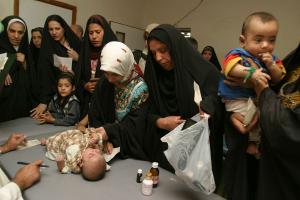Issue Date: May 23, 2003
U.S. must draw back from unilateralism statement says By BOB SMIETANA At the end of the 1991 Persian Gulf War and the post-Sept. 11 war in Afghanistan, many Americans turned their attention to other issues once fighting stopped. But with President Bush announcing an end to the war in Iraq, some interfaith leaders are trying to keep focus on the rebuilding of that country and its humanitarian crisis. “This is not a time for euphoria,” said the Rev. Bob Edgar, general secretary of the National Council of Churches. “It is a time to recognize that keeping and maintaining the peace may be more difficult than conducting this war.” The national council, along with the Islamic Society of North America and the Religious Action Center of Reform Judaism, sponsored a two-day domestic interfaith summit, which on April 30 issued an “Urgent Call for Reflection, Hope and Action,” following the Iraq war. “We are at a moment of choice even more urgent than before the war in Iraq began,” the statement said. “We are faced with choices between hope and courage or fear and violence; between a future characterized by global solidarity, international cooperation and multilateral action or one characterized by unilateralism and wars by choice rather than necessity; continuing terrorism; unfettered efforts to extend U.S. power; and the exploitation of fear.” Sayyid Muhammad Syeed, secretary general of the Islamic Society of North America, said the Bush administration has to “be very careful” in how it approaches rebuilding Iraq. “We [in the United States] have been able to build a society where there is respect for diversity and there is pluralism,” he said. “But these traditions cannot be imposed on other countries.” The United States should learn from “mistakes in the past” in the Middle East, said Syeed. “Our greatest mistake was in 1952 when during the Cold War we imposed the shah of Iran on the people of Iran against their will.” While the shah “represented modernity” and a vision for Iran the United States supported, “unless that vision is seen as indigenous, belonging to the people, they will never accept it,” Syeed said. “The result was that within one generation, whatever we had invested in Iran was lost. We do not want to have similar experiences repeated [in Iraq].” The interfaith statement, crafted by 75 mostly Christian, Jewish and Muslim leaders, also called for the United States to “draw back from the use and threat of first strike war,” and to “bring the U.S. occupation of Iraq to an end” by involving the United Nations as well as multilateral, nongovernmental organizations in rebuilding Iraq. The interfaith group also issued a shorter “words of reflection” statement giving thanks for “the end of large-scale hostilities, the end of an oppressive regime, and the safe return of our troops.” The group also called on President Bush to “distance himself from religious leaders who demonize the faiths of others” -- a reference to remarks made by evangelists such as Franklin Graham, Jerry Falwell and Pat Robertson who have labeled Islam an evil and wicked religion. Summit participants also expressed concerns that the human cost of the war, especially Iraqi civilians killed during the war, will be lost in the celebration of a U.S. victory. Jean Stokan, policy director of Pax Christi, said there needs to be an accounting of the number of civilians killed. “The American people need to see the bodies,” she said. “And it’s not over yet -- are we any more secure in this country [after this war]?” “The civilian casualties of this war are not limited to Iraqis,” said Rabbi Arthur Waskow of the Shalom Center in Philadelphia. “There are North Americans and Latin Americans, Africans and Asians who will be casualties over the years to come because money that could have been spent to heal illnesses, money that could have been spent to make schools that were decent is not being spent. And people will die from the non-spending of the resources and its use instead to destroy a society.” Kareem Irfan, chairman of the Council of Islamic Organizations of Greater Chicago, said he opposed the war out of concern that U.S. foreign policy was making it a “pariah” in the eyes of other nations. “I have told people that it is the patriotic duty of every American to speak up when actions that are being taken are not correct, when we feel like the country has gotten off the right path, whether it is in terms of domestic or foreign policy. If I do not speak up, then I am being unpatriotic,” he said.
National Catholic Reporter, May 23, 2003 |
